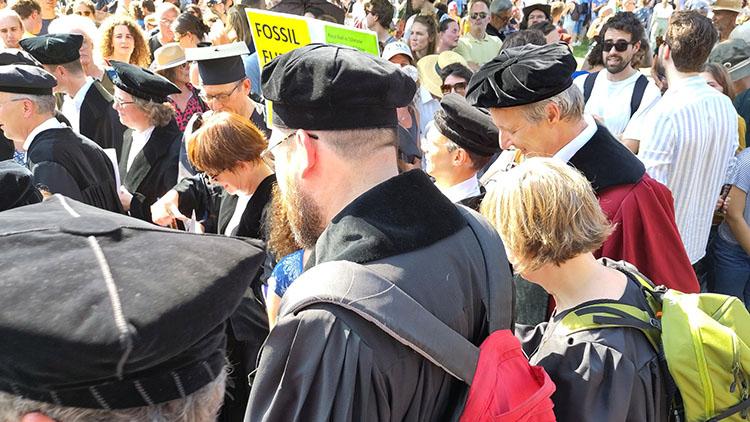Are professors allowed to wear their togas to protests against fossil fuel subsidies?
‘When we walked onto the motorway in our togas, there was a lengthy applause’

In the days leading up to the A12 blockade organised by the protest group Extinction Rebellion, several parties requested the Executive Board of Nijmegen's Radboud University to call for employees to join the protest wearing togas or white lab coats. Not only did the board refuse to do that but it also stated that it disapproves of professors wearing togas for such a purpose.
Representatives of science
In response, Spinoza award winner Klaas Landsman wrote a critical essay for the university magazine Vox (only available in Dutch, Ed.), arguing that someone wearing a toga does not represent a particular university but rather science itself. “Besides, one should emphasise that all protests by Extinction Rebellion have a scientific foundation, as they are based on IPCC reports,” reads the piece.
Liesbeth van de Grift, Professor of International History in Relation to the Environment, noted that the presence of people in togas seemed to move the protesters in the A12 blockade. “When we professors walked onto the motorway wearing our togas, there was a lengthy applause. They were so grateful that we were there as visible representatives of science. It was uneasy and touching at the same time."
That was the first time that Van de Grift wore a toga during a protest. Up until then, she didn’t feel comfortable setting herself apart in this manner. “This time, however, I was there representing my expertise, carrying a sign that said I would like to discuss my research with people. Hence my conclusion that the end justifies the means. A toga clearly has an impact after all,” she explains.
Values and principles
What about Utrecht University? What does its Executive Board think about the act of wearing togas during a protest? Asked to react to the discussion, rector Henk Kummeling indicated that the board values the involvement of UU professors in urgent societal themes. “We encourage their participation in public debates. But it should be noted that when someone wears a toga outside of the usual academic ceremonies and special activities such as Meet the Professor, they are not representing UU.”
“This means protesting in a toga is one’s own choice and responsibility. It’s up to the individual to make a personal choice in this regard. We assume that people can handle this responsibly and make this decision based on their expertise and affinity with the content. Moreover, a professor wearing a toga is expected to behave according to the values and principles that the toga represents, especially the code of conduct for research integrity,” Kummeling observes.
The code of conduct for research integrity focuses on ensuring that research and the assessment of research are fair and transparent. For example, researchers are not allowed to make unfounded claims and there is no room for commercial or political considerations when evaluating research.
No day off
Erik van Sebille, Professor of both Oceanography and Public Engagement, gave a speech during Friday’s school strike for the climate, also wearing a toga. “The strike was not a day off to me. I was working. I also wear my toga when I’m in front of a group of children for Meet the Professor. In both occasions, the toga makes me recognisable as a scientist, it shows that I represent science."
As such, it also means that Van Sebille adheres to the code of conduct for research integrity. “A toga is a uniform that represents the code of conduct. If you can contribute something during a state of emergency having that code as your principle, you should.” Van Sebille finds it important for scientists to keep an eye on society’s needs. “A lot of scientific literature shows that the public expects scientists to be activists as well: if they come across worrying data, they should ring the alarm."
Therefore, scientists are no longer expected to be strictly apolitical. Van de Grift recalls that the Covid-19 pandemic made that pretty clear. “Scientists were encouraged to join the public debate and advice policymakers. Why should that be any different when it comes to the climate crisis?” she wonders. “As scientists, we have an official responsibility towards society, which is why Scientist Rebellion has been joining climate-related protests for years.”
When a scientist protests wearing a toga, they are presenting a clear point of view about the direction policy should take. Van de Grift sees why people would be critical of this. “But I do think that I can show, through my research, that the history of climate change is characterised by continuously postponing issues and solutions. It’s not controversial at all that we need an ambitious climate policy now: IPCC's report says so. It’s not controversial either to state that the Dutch government isn’t doing much. The Urgenda case is a good example of that. Ending fossil fuel subsidies seems like low-hanging fruit to me,” she explains.